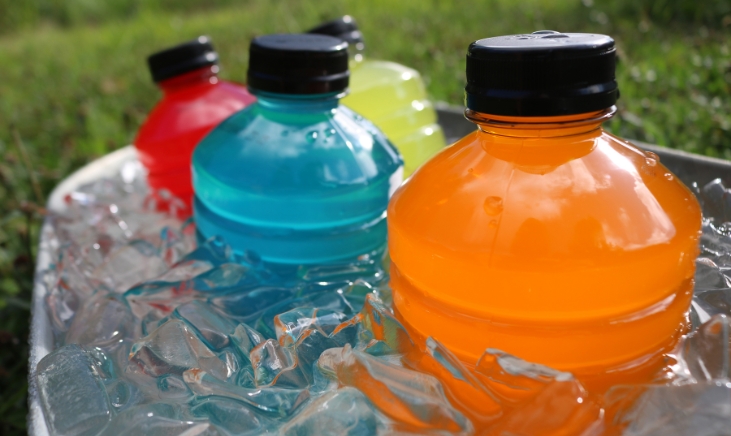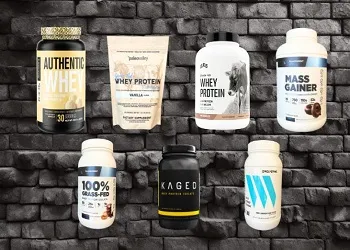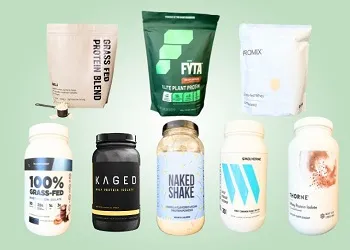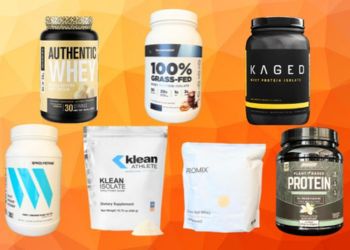If you’ve ever been hungover, you know the pain of just wanting the feeling to disappear. The headache, fatigue, and nausea are never fun.
Maybe you find yourself scouring the internet to point you to a magic pill, magic drink, or whatever will take your pain away and help it never return. Maybe you even get dramatic and swear you’re never drinking again.
Many people wonder “Why do electrolytes help hangovers(if they even do)? Electrolytes have often been touted as the answer to preventing and/or curing hangovers, but is this a proven fact? Is it a myth? Maybe it’s just the placebo effect?
In this article, we’ll break down the science connecting hangovers, hydration, and electrolytes so you can handle your next hangover like a pro. Better yet, you can never be hungover again.
Table of Contents
Short Summary
- Electrolytes are minerals that affect our hydration status and other processes within our bodies
- Alcohol causes dehydration, which contributes to the severity of a hangover
- Maintaining hydration and/or rehydrating are important for mitigating symptoms of a hangover
- Research does not show a clear benefit to consuming electrolytes to prevent and/or treat a hangover
What Are Electrolytes?
To start with the basics: electrolytes are simply minerals. They are found in our bodies and affect our hydration status by balancing the fluid levels both inside and between our cells. These compounds also influence our internal pH, muscle function, and other body processes.
Key electrolytes are:
- Sodium
- Potassium
- Phosphorus
- Calcium
- Chloride
- Magnesium
Many electrolyte beverages are available today. These beverages range from classic sports drinks like Gatorade and Powerade to electrolyte powders like Liquid IV and LMNT or dry electrolyte tablets like Nuun. Many of these hydrating electrolyte drinks are great for sports like cycling. Electrolytes are also naturally found in beverages like coconut water and foods like bananas.
What Is Electrolyte Imbalance?
In certain situations, our bodies have an oversupply of some electrolytes and not enough of others, leading to an electrolyte imbalance.
Serious electrolyte imbalances are seen with chronic alcohol use and some chronic diseases, including chronic kidney disease. However, severe imbalances are not as notable with less frequent drinking. While electrolyte balance may shift with alcohol consumption, it will likely correct itself reasonably quickly.
Now that we’ve covered electrolytes, let’s look at the other side of this equation: alcohol.
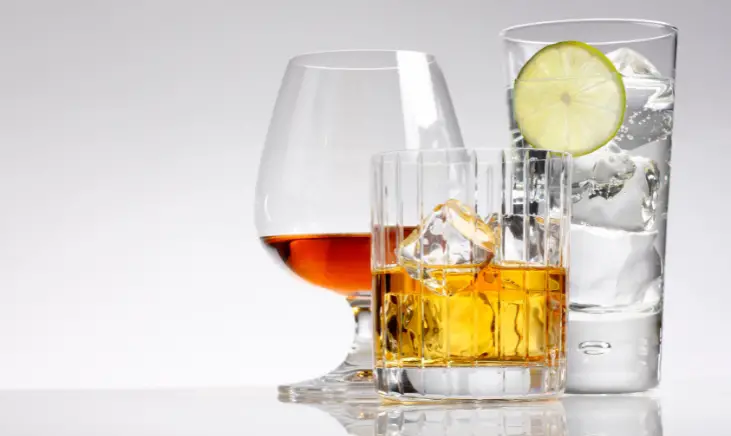
Why Does Alcohol Cause Hangovers?
Alcohol causes changes within our bodies. Some of the biggest changes after we drink alcohol include dehydration, sleep disturbances, oxidative stress, hormonal fluctuation, and immune system disruption.
The byproducts of alcohol metabolism, known as alcohol metabolites, contribute to hangover symptoms after drinking, especially after excessive alcohol consumption.
To keep things simple, we’ll focus mainly on the first two changes: dehydration and sleep. We’ll dive deeper into dehydration below, just a quick word on rest.
Alcohol affects our biological clocks and sleep quality. The lack of sleep– specifically high-quality, deep sleep– associated with a hangover, may have just as much to do with the effects you feel as the alcohol itself.
Hangover Symptoms
After a long night of drinking, some of the common symptoms of a hangover include:
- Dehydration
- Electrolyte imbalance
- Sleep disruption
- Alcohol withdrawal
- Low blood sugar
- Gastrointestinal inflammation

What’s the Fastest Way to Get Rid of a Hangover?
The best way to get rid of a hangover is to avoid becoming hungover. However, the only way to ensure you don’t become hungover is to avoid alcohol consumption altogether.
It’s worth noting that the severity of a hangover is directly related to the amount of alcohol consumed and the level of intoxication reached. Each alcoholic drink contributes to a worse hangover. Your personal alcohol tolerance does play a role here.
What’s not related to the severity of a hangover? There is no association between the type of alcohol consumed or the order of alcohol consumed and hangover symptoms. Any alcoholic beverage can cause a hangover, and liquor before beer is a myth.
Regardless, if you’re already hungover, none of this will help. Sadly, the only reliable way to get rid of a hangover is to give it time and let it pass. While your friends, influencers, and the internet may all throw hangover cures at you, there isn’t substantial scientific data to back most of them up.
We know that dehydration and sleep deprivation contribute to hangovers,, so while science can’t promise it will help, it doesn’t hurt to prioritize sleep and hydration.
As promised, let’s dive deeper into hangovers and hydration.
Does Hydrating Help a Hangover?
Alcohol is a diuretic, meaning it increases your urine output. You may notice yourself making more frequent trips to the bathroom during a night of drinking, especially after you metaphorically “break the seal.”
If you are not matching your fluid input with this increased output,, you will lose more fluid than you are taking in. This leads to dehydration, which can play a role in your hangover the next day.
Unfortunately, your alcoholic beverages aren’t rehydrating you. This is where water and/or an electrolyte drink come in.
What is the Best Drink for Hangovers?
As we just said, we want more fluid in our bodies to prevent or mitigate the effects of a hangover. The goal is to replace the water lost from the diuretic effect of consuming alcohol and return our body to optimal hydration.
This is where the great debate of water versus an electrolyte drink begins.
Water vs. Electrolytes
To be clear, no concrete scientific data exists on the benefits of water versus a manufactured electrolyte drink for hangovers specifically.
However, some studies show that sports drinks rehydrate better than water alone when the body is in a depleted state. These studies use exercise to induce a depleted state, not alcohol, so take them with a grain of salt in this scenario.

Drink Water to Replenish Lost Fluids
Water is a clear “yes” for rehydration. When our bodies are dehydrated, we need more water. Alcohol causes dehydration. When drinking alcohol, we need more water. It’s as simple as that.
Now, to get to the real question: do you need electrolytes, too?
Do Electrolyte Drinks Actually Help Prevent a Hangover?
Unfortunately, the vast majority of science says no. There is not an increased benefit to consuming electrolytes with water to prevent or treat hangover symptoms.
While many people tout the benefits of an electrolyte drink as a hangover helper, there is not substantial scientific data to back this up.
While dehydration is linked to hangover symptoms, electrolyte levels, specifically sodium, potassium, chloride, calcium, and magnesium, are not associated with hangover severity.
Our bodies are smart and work to restore balance in all forms quickly. Some science suggests our body can quickly restore electrolyte balance without using an electrolyte drink.
Other researchers looked at a combination of electrolyte and vitamin ingestion after alcohol consumption and found no significant improvements to hangovers.
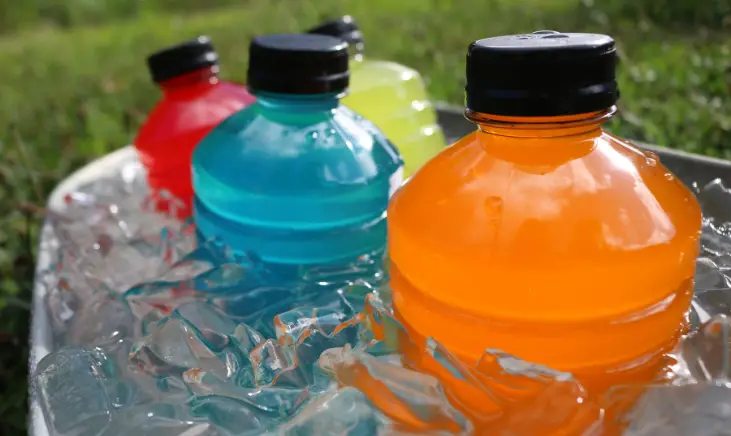
Should you drink electrolytes with alcohol?
Current scientific data says it won’t benefit you to substitute an electrolyte drink for water.
While research doesn’t support the benefit of electrolytes for preventing or curing hangovers, there may be some logical benefits to consuming electrolytes with alcohol.
We know alcohol causes dehydration, so it is often suggested to drink extra water while drinking. Some recommend alternating alcoholic beverages and water to maintain hydration status while drinking.
If adding an electrolyte drink or electrolyte powder to your water helps you drink more water, that in and of itself will help reduce dehydration and hangover severity. While the electrolytes may not be helping, they certainly are not hurting in this case.
Another time electrolytes may be beneficial is if you experience vomiting and/or diarrhea after drinking. These gastrointestinal complications cause larger losses of fluid and electrolytes, so replenishing electrolytes in this situation may be more beneficial..
The placebo effect is still an effect. If you firmly believe that having a Gatorade after a long night out saves you, there’s also no data to say it’s hurting you, so drink away!
How to Actually Help Prevent a Hangover?
Although chugging a bunch of electrolytes isn’t sure to save you, we have picked up a few tips we want to summarize.
Remember, your level of intoxication directly impacts your hangover. That extra alcoholic beverage may be better off swapped for a hydrating one.
Also, dehydration and sleep disturbances are two of the biggest causes of hangovers. Prioritizing hydration before, during, and after a night of drinking can help you avoid a horrible hangover. Ensuring you get a good night’s rest with the best quality and quantity of sleep possible after drinking will also help you feel better when you wake up.
Summary
Electrolytes are minerals that play a role in our hydration status. Alcohol is a diuretic and dehydrates our bodies. Dehydration is directly linked to developing a hangover.
Common sense is drinking an electrolyte beverage reduces dehydration and improves a hangover. However, there is no scientific data to back this idea up.
While drinking electrolytes may help you drink more water and relieve your hangover, the water, not the electrolytes, is saving you.
FAQ
Is it good to drink electrolytes before drinking alcohol?
While it likely won’t benefit you more than drinking water, consuming a hydrating beverage before drinking alcohol will help maintain your hydration status.
Be sure to also drink nonalcoholic beverages during and after drinking alcohol, too. This also helps optimize hydration and prevent the dehydration associated with hangovers.
What is the best thing to drink to prevent a hangover?
Water is best. However, any beverage that doesn’t contain alcohol or caffeine will help to hydrate you.
If you drink mixed drinks or cocktails with sweetened mixers, avoid beverages with added sugars to minimize your total sugar intake.
Does Pedialyte prevent hangovers?
Pedialyte is an electrolyte beverage meant to help rehydrate a dehydrated body.
While it is a great electrolyte drink, there is no science to show that electrolyte beverages contribute greatly to electrolyte replenishment to prevent hangover symptoms.
Pedialyte is just one example. Other examples of electrolyte drinks include Gatorade, Powerade, Body Armour, Liquid IV, Nuun, Ultima, and LMNT, just to name a few.
Is Gatorade better than coconut water for hangovers?
Coconut water is another example of an electrolyte-rich beverage, albeit a naturally occurring one.
The electrolyte profile of coconut water is slightly different than that of traditional sports drinks or other electrolyte beverages. However, the same research applies, and there is no proven benefit to drinking coconut water for a hangover.
Again, the natural electrolytes in coconut water will help you get more fluid and rehydrate, but it’s the fluid, not the electrolytes, that are the hangover cure.
References
“Electrolytes: MedlinePlus Medical Encyclopedia.” Medlineplus.gov, medlineplus.gov/ency/article/002350.htm#:~:text=Electrolytes%20are%20minerals%20in%20your.
“Hangovers | National Institute on Alcohol Abuse and Alcoholism (NIAAA).” Www.niaaa.nih.gov, www.niaaa.nih.gov/publications/brochures-and-fact-sheets/hangovers#:~:text=To%20help%20ease%20their%20hangover.
James, Lewis J., and Susan M. Shirreffs. “Effect of Electrolyte Addition to Rehydration Drinks Consumed after Severe Fluid and Energy Restriction.” Journal of Strength and Conditioning Research, vol. 29, no. 2, Feb. 2015, pp. 521–527, https://doi.org/10.1519/jsc.0000000000000657.
Masoumeh Moslemi, et al. “Detoxification Activity of Bioactive Food Compounds against Ethanol‐Induced Injuries and Hangover Symptoms: A Review.” Food Science & Nutrition, 30 June 2023, https://doi.org/10.1002/fsn3.3520.
Palmer, Emily, et al. “Alcohol Hangover: Underlying Biochemical, Inflammatory and Neurochemical Mechanisms.” Alcohol and Alcoholism, vol. 54, no. 3, 27 Mar. 2019, pp. 196–203, https://doi.org/10.1093/alcalc/agz016. Accessed 21 Aug. 2023.
Swift, R, and D Davidson. “Alcohol Hangover: Mechanisms and Mediators.” Alcohol Health and Research World, vol. 22, no. 1, 1998, pp. 54–60, www.ncbi.nlm.nih.gov/pmc/articles/PMC6761819/#:~:text=Generally%2C%20the%20greater%20the%20amount. Accessed 22 Aug. 2023.
Tipple, Celeste T., et al. “A Review of the Physiological Factors Associated with Alcohol Hangover.” Current Drug Abuse Reviews, vol. 9, no. 2, 17 May 2017, pp. 93–98, https://doi.org/10.2174/1874473710666170207152933.
